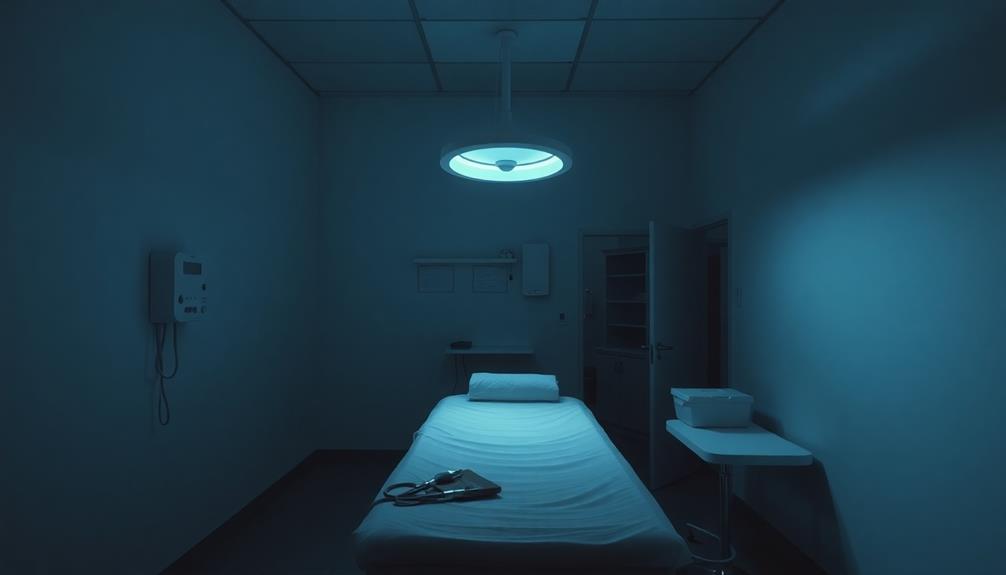Certain STDs can produce strong and often unpleasant odors that signal health issues. For instance, trichomoniasis may have a foul, onion-like smell, while gonorrhea can emit a fishy or musty odor. Chlamydia typically doesn't carry a distinct smell, but bacterial vaginosis often leads to a notable fishy odor, especially after sex. These scents usually hint at infections caused by harmful bacteria. If you notice any unusual odors, it's important to talk to a healthcare professional right away. Understanding these signals helps keep you healthy and informed, so let's explore more about how to manage and recognize these concerns!
Key Takeaways
- Trichomoniasis often produces a strong, unpleasant onion-like odor, accompanied by yellow or green discharge.
- Gonorrhea is associated with a distinctive foul smell, often described as fishy or resembling mushrooms.
- Bacterial Vaginosis typically emits a strong fishy odor, especially noticeable after sexual activity.
- Chlamydia may occasionally produce unusual odors, but it is often asymptomatic and less pronounced than other STIs.
- Persistent or strong odors may indicate infections and warrant medical attention for proper diagnosis and treatment.
Introduction

When it comes to sexually transmitted infections (STIs), many people may not realize that certain conditions can produce distinctive odors. You might encounter an unusual vaginal smell, and while it can be alarming, it's important to understand what that could mean.
For instance, trichomoniasis can lead to a foul, onion-like odor in vaginal discharge. Similarly, gonorrhea might create a smell that some describe as similar to mushrooms or even fish. Chlamydia is often silent, meaning it usually doesn't show symptoms, but unusual odors can still happen.
Additionally, lifestyle factors and overall health can influence the presence of these odors, highlighting the importance of early screenings and lifestyle modifications for maintaining well-being.
Bacterial vaginosis, while not technically an STI, can also cause a fishy odor due to an imbalance of bacteria in your vagina, making it easier for STIs to take hold.
Remember, these odors can vary widely among individuals, so just because you notice an abnormal vaginal odor doesn't automatically mean you have an infection. It's essential to seek medical care if you're concerned.
Talking to your healthcare provider can help you get the answers you need, ensuring your health stays a priority. Understanding these smells can empower you to take charge of your well-being!
Description of the Smell

Unusual odors can be a significant indicator of underlying health issues, particularly with STIs. When you notice a strong vaginal odor, it might be your body's way of signaling something's off.
Some infections, like trichomoniasis, can produce a foul or onion-like smell, often accompanied by yellow or green discharge. Regular screening methods, such as mammography guidelines, are essential for early detection of health issues, which can include various infections. You might also experience symptoms of trich that warrant a visit to your healthcare provider.
Gonorrhea can lead to a distinct, unpleasant smell, often described as fishy or even resembling mushrooms. Chlamydia may cause unusual vaginal odors too, but the scent mightn't be as strong as with trichomoniasis or gonorrhea.
Bacterial vaginosis, while not an STI, can create a strong fishy odor, especially after intercourse, and it's crucial to note that this condition can increase the risk of STIs.
If you notice any of these unusual vaginal odors, don't hesitate to get tested. Remember, the presence of an odd smell doesn't definitively mean you have an STI, but STD tests are essential for accurate diagnosis and treatment. Taking charge of your health is always a good idea!
Source and Composition

The source and composition of odors linked to STDs often stem from the specific bacteria or pathogens involved in each infection. Different infections can cause various smells, and your unique body chemistry plays a big role too!
For instance, trichomoniasis is known for producing a strong, unpleasant, musty smell, especially when there's unusual discharge. Additionally, navigating the emotional complexities of relationships affected by conditions such as BPD can lead to misunderstandings.
Gonorrhea can create a distinctive foul odor, often compared to mushrooms or fish. However, it's important to note that these smells aren't used alone for diagnosis.
Chlamydia can also bring about unusual vaginal odors, but many people don't experience any noticeable smell at all. Meanwhile, bacterial vaginosis, while not classified as an STD, can cause a fishy odor and may increase your risk of other infections.
If you notice any strange smells or changes in your body odor, it's a good idea to seek medical advice. STD testing can help you understand what's going on.
Typical Scenarios or Environments

Experiencing a strong odor from genital areas can often occur in specific situations or environments. For instance, if you've had unprotected sex or are simply going through hormonal changes, you might notice a foul-smelling discharge.
STIs like trichomoniasis can produce a strong, rank odor, often described as similar to onions. Gonorrhea can bring about an unpleasant smell, which may remind you of mushrooms or fish.
Bacterial vaginosis, although not an STI, can also lead to a fishy odor, particularly after sexual intercourse. This indicates an imbalance in your vaginal flora.
Chlamydia might cause unusual odors, but it often shows no symptoms at all, making regular testing super important for everyone. If you notice a strong, unusual odor in your genital areas, it could signal an infection or STI.
In such cases, it's crucial to seek medical evaluation. Getting tested can provide peace of mind and help you receive the right treatment.
Emotional or Cultural Associations

Strong odors from genital areas can evoke a mix of emotions, often leading to feelings of shame, anxiety, or embarrassment. When you notice an unusual odor, it's common to feel worried about what it might mean for your health. These emotional responses can make it hard for you to seek medical help.
Cultural perceptions play a big role in how we view body odors. In some cultures, natural scents are perfectly normal, while others emphasize the need for cleanliness and odorlessness. These differences can influence how you feel about your own body and odors.
Stigmas surrounding STDs can also create fear and misconceptions, making it harder for you to talk openly about sexual health.
Education is vital for breaking down these barriers. Understanding that body odors can vary and that they're often normal can help reduce anxiety and shame. When people engage in conversations about sexual health, it opens the door for better understanding and acceptance.
Health or Safety Considerations

Awareness of your body's signals is crucial for maintaining sexual health. If you notice unusual smells, such as strong or unpleasant odors, it could be a sign of an underlying issue. Conditions like bacterial vaginosis or infections like trichomoniasis, chlamydia, and gonorrhea can cause these odors.
Sweat and changes in your body's chemistry can also lead to different smells. For example, yeast infections might cause an odor similar to bread, while vaginal discharge can vary in scent too.
It's essential to remember that good bacteria in your body help keep things balanced, but when those bacteria are disrupted, it may lead to health issues. If you experience persistent odors, especially with discharge or irritation, don't hesitate to seek medical help.
Regular STI testing is important, as many infections can be asymptomatic.
Final Thoughts

In considering your sexual health, it's vital to be vigilant about any changes your body may signal, including unusual odors. While it's normal for sweat and saliva to create some smells, you should pay attention if you notice something off.
Common causes of vaginal smells can include hygiene issues or infections like bacterial vaginosis, not just STDs. For instance, if you experience metallic vaginal odors or notice a strong scent when you have your period blood, it might just be a natural response.
However, if an odor is accompanied by discharge, like yellow or green, it could mean an infection like gonorrhea. Remember, a forgotten tampon can also cause funky smells, so keep an eye on that!
Regular testing is important, as many STDs can be asymptomatic. If you ever feel concerned about persistent odors or other symptoms, don't hesitate to seek medical advice.
Early detection can help prevent complications and keep your body healthy. Ultimately, being aware and proactive about your sexual health can empower you to enjoy a happier, healthier life!
Frequently Asked Questions
What Would an STD Smell Like?
When you notice unusual odors from your genital area, it might indicate an infection. While some STIs can produce distinct smells, it's crucial you get tested for an accurate diagnosis rather than relying solely on odor.
Does Chlamydia Have a Scent?
Chlamydia doesn't always have a distinct scent. You might notice unusual odors if symptoms appear, but many people don't experience any noticeable smell. Regular testing is crucial for your sexual health, regardless of scent.
How Does Gonorrhea Smell?
If you're experiencing unusual genital odors, gonorrhea might be the cause. Infected individuals often report foul smells, sometimes likened to mushrooms or fish. It's crucial to seek medical advice and get tested promptly.
Do STDS Cause Bad Body Odor?
Yes, STDs can cause bad body odor. Infections may lead to foul-smelling discharge or changes in your natural scent. Maintaining good hygiene and monitoring your health can help manage any unpleasant odors.









